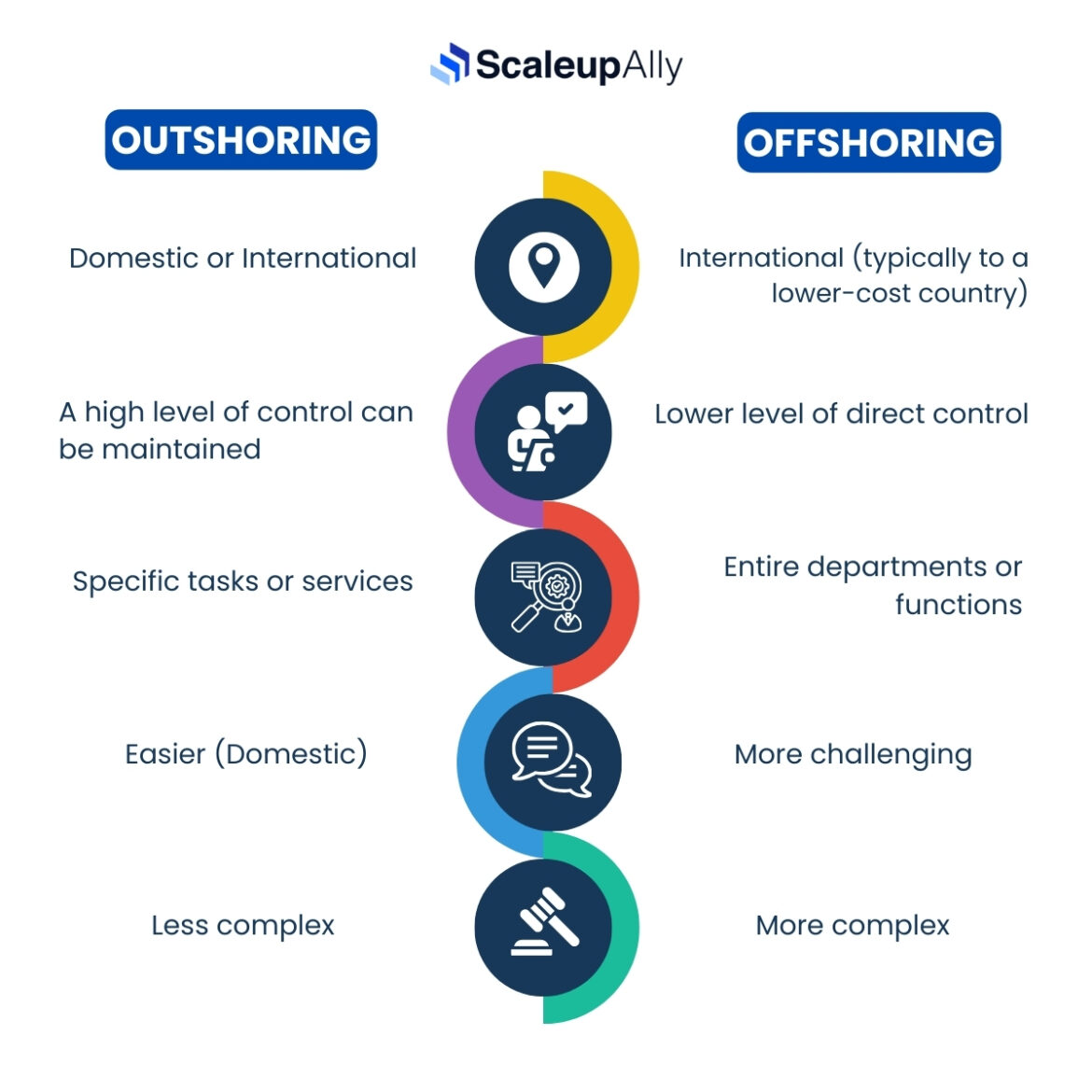
Outsourcing vs Offshoring: Understanding the Key Differences
Pranay Agrawal | June 24, 2024 , 13 min read
Table Of Content
The future of improving business efficiency is already here, and it revolves around two important concepts: outsourcing and offshoring.
Imagine you’re a business owner with too much work to handle on your own. Outsourcing and offshoring are like hiring extra help to ease your workload. The difference lies in where you hire this help from.
While these terms are often tossed around like synonyms, there’s a world of difference between delegating tasks to a local freelancer (outsourcing) and setting up a whole new operation overseas (offshoring).
In this blog, we’ll clarify the differences between outsourcing and offshoring. Understanding these distinctions will help you decide where to invest your resources and drive your business forward.
Key Takeaways
- Outsourcing focuses on delegating defined tasks to third-party providers, while offshoring shifts entire functions abroad for cost efficiency.
- Businesses retain greater operational control in outsourcing, whereas offshoring requires robust structures to manage overseas operations.
- Outsourcing is ideal for short-term, specific projects, while offshoring is better suited for continuous, large-scale departments.
- Both strategies deliver significant cost savings and scalability, but outsourcing ensures smoother collaboration and quicker adaptability.
- Risks such as communication hurdles, quality concerns, and regulatory complexities highlight the need for careful partner selection and management.
5 Key Differences Between Outsourcing and Offshoring

How are outsourcing and offshoring different? While both outsourcing vs offshoring involve delegating tasks outside your company, there are some crucial distinctions between the two approaches. Let’s examine these key differences:
Location
Outsourcing involves contracting a third-party company, regardless of location, to handle specific tasks or services. This company could be down the street or across the country. Offshoring, on the other hand, specifically refers to relocating a business function or department to a different country, typically with lower labour costs.
Also Read: How To Build An Offshore Development Centre?
Level of Control
The level of control you maintain over the work also differs. When you outsource, you’re still working with an external company, but you can maintain a high degree of control by setting clear expectations and managing the project closely. Offshoring often involves setting up a new operation in a different country, which can mean less direct control over day-to-day operations.
Scope of Work
The scope of work outsourced is typically smaller and more well-defined. You might outsource tasks like graphic design, marketing campaigns, or specific software development projects. Offshoring often involves moving entire departments or functions, like customer service or manufacturing, to a different location.
Communication and Collaboration
Communication and collaboration are generally easier with domestic outsourcing partners due to shared time zones, language, and cultural norms. With offshoring, communication and collaboration can be more challenging due to time zone differences, language barriers, and cultural differences. This can lead to misunderstandings and delays.
Legal and Regulatory Environment
With outsourcing, you’re subject to the legal and regulatory environment of both your location and the outsourcing partner’s location. On the other hand, you’ll need to comply with the legal and regulatory environment of the country where you’re offshoring. This can add complexity and require additional expertise.
The table below summarises the key differences between offshoring vs outsourcing
| Feature | Outsourcing | Offshoring |
| Location | Domestic or international | International (typically to a lower-cost country) |
| Control | A high level of control can be maintained | Lower level of direct control |
| Scope of Work | Specific tasks or services | Entire departments or functions |
| Communication & Collaboration | Easier (Domestic) | More challenging |
| Legal & Regulatory Environment | Less complex | More complex |
Also Read: In-House vs Outsourcing Software Development: Which is Better?
Pros and Cons of Outsourcing
Outsourcing can help businesses run more efficiently, but it also has some downsides. Let’s look at the pros and cons of outsourcing:
Pros of Outsourcing
- Cost Saving: One of the primary benefits of outsourcing is the potential for significant cost savings. Labour costs can be lower in certain countries, and outsourcing providers may have economies of scale that allow them to deliver services more efficiently.
- Access to Specialised Skills: You can tap into a wider talent pool and gain access to specialised skills or expertise that may not be readily available in your local area.
- Increased Efficiency: Free up your internal resources to focus on core competencies and strategic initiatives by outsourcing non-core functions.
- Scalability: Outsourcing allows you to easily scale your workforce up or down based on your needs, providing greater flexibility.
- Innovation: Outsourcing companies can offer new ideas and creative ways to solve your business challenges.
Cons of Outsourcing
- Loss of Control: When you outsource, you relinquish some degree of control over the work process and quality standards. Careful selection and management of outsourcing partners are crucial.
- Communication Challenges: Communication barriers can arise, especially when outsourcing to a different country or time zone. Clear communication strategies and defined expectations are essential.
- Data Security Risks: Sharing sensitive data with an external provider can pose security risks. Robust data security protocols are necessary.
- Intellectual Property Concerns: Outsourcing certain tasks might involve sharing intellectual property with the provider. Clear legal agreements are vital to protect your intellectual property rights.
- Potential Quality Issues: There’s a risk of receiving work that doesn’t meet your quality standards. A thorough vetting process and clear quality control measures are crucial.
By carefully considering the pros and cons of outsourcing, you can decide if it’s a good idea for your business.
Pros and Cons of Offshoring
Offshoring can be a tempting strategy for businesses seeking to cut costs, but it’s not without its challenges. Here’s a breakdown of the advantages and disadvantages of offshoring:
Pros of Offshoring
- Significant Cost Savings: The primary driver for offshoring is often the potential for substantial cost savings. Lower labour costs in certain countries can significantly reduce operational expenses.
- Access to a Larger Talent Pool: Offshoring opens doors to a wider pool of skilled workers, especially in areas with high demand and limited local availability.
- Round-the-Clock Operations: By strategically locating your offshore operations, you can benefit from extended working hours, potentially offering 24/7 customer support or continuous production cycles.
- Tax Advantages: Some countries offer tax breaks and other incentives to attract foreign investment, further reducing your overall costs.
- Focus on Core Business: Offshoring non-essential functions allows your internal team to focus on core competencies and strategic initiatives for a competitive edge.
Cons of Offshoring
- Complexities of Management: Managing an offshore operation can be complex due to geographical distance, cultural differences, and potential language barriers. Effective communication and strong leadership are crucial.
- Loss of Control: With a physical operation overseas, you have less direct control over day-to-day activities, quality standards, and employee management. Careful planning and oversight are essential.
- Hidden Costs: While labour costs may be lower, there can be hidden expenses associated with offshoring, such as transportation, infrastructure setup, and communication technology. To avoid surprises, businesses should calculate offshore development costs comprehensively, factoring in both direct and indirect expenses.
- Intellectual Property Risks: Sharing intellectual property with an offshore entity can pose security risks. Strong legal agreements and data security protocols are necessary.
- Potential Quality Issues: Quality control can be a challenge with offshore operations. Implementing a quality control system and conducting regular audits are vital.
- Ethical Concerns: Concerns may arise regarding labour practices, environmental regulations, and worker safety standards in some countries. It’s crucial to choose an offshore location with ethical practices that align with your company values.
The decision to offshore requires careful consideration of both the potential benefits and the associated challenges. By weighing these factors and implementing strong management practices, offshoring can be a successful strategy for some businesses.
Which Approach is Right For Your Business?
Both outsourcing vs offshoring can benefit businesses looking to improve operations and stay competitive. However, the best choice depends on your company’s unique needs and goals. Here’s a guide to help you decide:
1. Analyse Your Business Needs
- Core Competencies: Identify your company’s core competencies and the areas where you excel and hold a competitive advantage. These are the functions you should likely keep in-house to maintain control and ensure quality.
- Resource Constraints: Evaluate your current resources, including budget, manpower, and expertise. Outsourcing or offshoring can free up internal resources to focus on core functions but also requires careful management of external partners.
- Project Scope and Timeline: Consider the size and complexity of the tasks you’re considering delegating. Outsourcing is well-suited for well-defined, short-term projects, while offshoring may be more appropriate for ongoing functions.
2. Compare the Pros and Cons
As explored earlier, both offshoring and outsourcing have advantages and disadvantages. Carefully weigh the potential benefits, such as cost savings, access to talent, or increased efficiency, against the drawbacks, like loss of control, communication challenges, or quality concerns.
3. Location and Cultural Considerations
- Cost Factors: Analyse the actual cost savings potential when considering location. Factor in labour costs, but also potential hidden expenses like transportation, infrastructure setup, and communication technology.
- Cultural Differences: If considering offshoring, be mindful of cultural differences and potential language barriers. Choose a location with a business culture that aligns with yours, and invest in building strong communication channels.
4. Management and Control
- Outsource vs Offshore Management: Outsourcing generally offers a higher degree of control over projects and day-to-day operations. Offshoring requires a more robust management structure to bridge geographical distances and cultural differences.
- Quality Control: Establish clear quality control measures whichever approach you choose. Regular communication, performance monitoring, and potential on-site visits are crucial for ensuring consistent quality standards.
5. Data Security and Intellectual Property
- Data Security Protocols: When outsourcing or offshoring, implement data security protocols to safeguard sensitive information. Ensure your partners have adequate security measures in place.
- Intellectual Property Protection: Protect your intellectual property through clear legal agreements with outsourcing or offshoring partners.
Also Read: IT Staff Augmentation vs IT Project Outsourcing: What You Should Know?
A Hybrid Approach
In some cases, a hybrid approach combining both outsourcing and offshoring may be the best solution. For example, you might outsource specific tasks to a local freelancer while offshoring a larger department to a lower-cost location.
In simpler terms, whether you should outsource or offshore depends on understanding what your business needs, knowing the pros and cons, and having a plan to manage external partners. By thinking about these things carefully, you can pick the best option to help your business succeed globally.
Conclusion
Offshoring and outsourcing can be powerful tools for businesses looking to improve efficiency and stay competitive. However, it’s important to understand the main differences before deciding which one is right for you.
Outsourcing means hiring another company to handle specific tasks or services, no matter where they are located. This gives you a lot of control and works well for clearly defined projects.
Offshoring, on the other hand, involves moving a part of your business to another country, usually to take advantage of lower labour costs. While this can save you money and give you access to more talent, it also comes with challenges like dealing with distance and cultural differences.
The best choice for your business depends on your unique needs, resources, and goals. Think about the points mentioned in this guide, consider the advantages and disadvantages of each option, and don’t hesitate to mix and match offshoring and outsourcing to get the best results.
Are you ready to move forward? Do some more research on the best practices for outsourcing and offshoring, and look into resources that can help you make this decision. By choosing the right approach and having a clear plan, you can make the most of these strategies and help your business grow.
ScaleupAlly can offer you expert offshore development centre services and solutions that can take your business to new heights in the future.
Frequently Asked Questions (FAQs)
Q: What is the difference between outsourcing and offshoring?
Both offshoring and outsourcing involve delegating tasks outside your company, but the key difference is location:
- Outsourcing: Contracting a third-party company, regardless of location, to handle specific tasks or services. This company could be down the street or across the country.
- Offshoring: Relocating a business function or department to a different country, typically with lower labour costs.
Q: What is an example of outsourcing?
Common examples of outsourcing include:
- Hiring a freelance graphic designer to create marketing materials.
- Contracting a software development company to build a specific application.
- Enlisting a payroll processing service to manage your company’s payroll.
Q: Is it possible to combine outsourcing and offshoring?
Absolutely! A hybrid approach can be effective for some businesses. For instance, you might outsource specific IT tasks to a local freelancer while offshoring your customer service department to a lower-cost country.
Related Blogs

Nearshoring vs. Offshoring vs. Onshoring: Key Differences
Discover the key differences between nearshoring, offshoring, and onshoring. Learn the benefits, challenges, and how to choose the best outsourcing strategy for your business.
webadmin
Feb 13 ,
6 min read

Top 20 Emerging Technologies of 2026
Discover the top 20 emerging technologies of 2026. Explore which innovations are driving change across healthcare, finance, manufacturing, and other crucial industries.
ScaleupAlly Team
Dec 16 ,
9 min read

IT Outsourcing Costs Explained: Global Rates, Key Influencers & Cost-Saving Tips
Discover what IT outsourcing costs include, key pricing factors, hidden fees, regional rates, and how to pick a cost-effective outsourcing partner.
Pranay Agrawal
Nov 29 ,
13 min read



